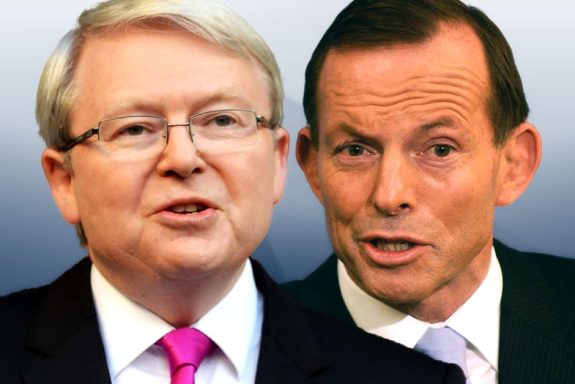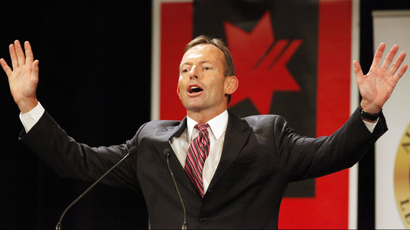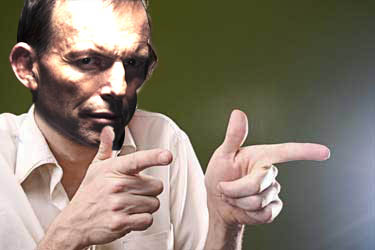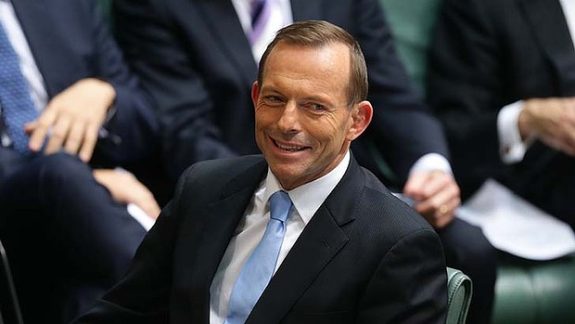Forging the Wrong Leaders

“We are not the Labor party.” Amongst the leadership tensions of the past few weeks in the ruling Coalition government, Prime Minister Tony Abbott appears to have adopted this as a mantra of sorts, an incantation to ward off the attacks of his foes both inside and outside of his own party. A return to the internecine warfare of 2010 and 2013, he argues, would make the Liberal party as bad as their predecessors. He speaks as if there is something qualitatively different between the parties and the way they go about their operation, as if the Liberal and Labor parties have entirely different and incompatible DNAs.
Whilst the spill motion may have failed, the simple fact that the motion was raised shows that this is manifestly untrue.
Labor has not been slow to join in the chorus of jibes, directly quoting back invective initially directed at Julia Gillard and Kevin Rudd by Abbott and his fellows. There is no shortage of material to use. Tony Abbott, Joe Hockey, Christopher Pyne and others were incessant in their criticism of Labor’s leadership woes, all at the instigation of the consummate attack dog who now finds the tables turned. The rich irony is that leadership battles are only unpalatable because Tony Abbott made them so. They are not new to Australian politics.
Admittedly, leadership changes at the Federal level are rarer than in State politics. Additionally, many Prime Ministers step down “gracefully” before the inevitable push. It is not until Kevin Rudd and Julia Gillard – and the unedifying return to Rudd – that replacement of a sitting Prime Minister by force became somewhat common. However, the attempt by Liberal backbenchers to push a spill motion and depose Tony Abbott shows that leadership battles are not restricted to one side of politics. They are caused by something deeper – a malaise in politics.
“To lose one Prime Minister may be regarded as a misfortune. To lose two looks like carelessness.” (With apologies to Oscar Wilde.)
Deposing (or attempting to depose) a sitting, first-term Prime Minister is, admittedly rare – at least, until recent years. So how is it that we’ve come to this?
Kevin Rudd came to power in 2007 with a sweeping majority and the hopes and aspirations of Australians behind him. Less than three years later he was pushed from office, a broken, tearful man. What forces wrought the triumphant visionary of Kevin 07 into the chaotic, vindictive morass he became?
The issue at the heart of Kevin Rudd’s downfall was his inability to govern. Rudd was a great communicator, an idealist, a visionary and a fantastic politician for elections. In government, however, he proved lacking in the skills and attributes required of a Prime Minister. This came about, essentially, because elections and governments require very distinct skill-sets. What makes a great leader during an election campaign does not make a wonderful leader in power. Unfortunately, the reverse is also often true: great leaders may be let down by their inability to win elections.
Our modern democracy revolves around elections. They are the fixed points at which the people can have their say. It has been argued that Australia is a democracy for a month or so every three years, after which it becomes an effective oligarchy. There is some truth to this.
Increasingly, however, the three years between elections are conducted with an unremitting focus on the next election. Oppositions have this easy: they spend their years in the political wilderness with nothing but the next election to think about. Government is a harder job. Making decisions in the greater good, aware that every action will have detractors, will be attacked by the opposition and by the media, requires courage. Making decisions aimed solely at bolstering the government’s reputation at the next election is easier.
During elections, enormous sums of money are spent on revealing and promoting policy, on attacking political opponents, and on strategising the message. How much do you reveal? How long can you keep your best offerings hidden, in order to best capture public approval whilst restricting the other party’s opportunity to respond? All is done with an eye on the prize – the all-important twelve hours when the electoral booths are open.
Elections are replete with unreasonable expectations, with impossible promises, and unfortunately often, dirty tactics. Throw a partisan media into the mixture and an election becomes so much froth and noise, a lot of the detail can be obscured.
But then the election is over. The winning party is expected to segue into governing. Suddenly there is no money for advertising. The messaging takes a back seat: governing is a long game. In governing, there is limited value to continuing to attack the other side. Even a party which had the media’s partisan support during the election can find, all too soon, that it becomes hostile. Sudden attention is paid to detail. Promises were made during the campaign, but when it comes to execution, any number of headwinds interfere: from the quality of the public service to unexpected financial setbacks. Changing circumstances require flexibility, but promises and public expectations are not flexible.
In the public’s view, the choice has been made. The election is over: it is time to make good on the promises. And woe betide a party that cannot deliver on its promises, the next time elections come around.
Promises are the currency of elections
Campaigning requires a particular skillset of a political party and its leaders. Leaders must bring inspiration and vision. An election from opposition can be carried on criticism of the government, but only insofar as plans can be proposed to address the identified shortcomings. Attacking your opponents will get you only so far; a party needs to explain what it would do differently. The universal truth of electoral campaigns is promises.
Kevin Rudd was a great campaigner. He brought vision and grand plans. His rhetoric inspired the young and the old alike in an idea of what Australia could be. He promised changes that would be difficult, but he made them sound easy, and he had obvious commitment to his cause. Kevin 07 was a whirlwind of hope, and with a strong team behind him, he made his promises sound convincing.
Unfortunately, Kevin Rudd proved to be terrible at governing. The essential qualities of a government leader are the ability to negotiate, persistence to follow-through on projects, focus on detail, delegation and empowerment of your team, and detailed planning. These were not Kevin Rudd’s strengths. In eternal search for polling approval, Rudd lacked the ability to push projects through to completion against critical media campaigns and public resistance. His inability to delegate power and responsibility was also a detriment. In an election, the leader’s visibility and personality are critical to success. But Australia is too large and complex for a single leader, however frenetic, to manage. Kevin Rudd and his centralisation became a bottleneck, and Labor was unable to effectively execute on its promises.
Kevin Rudd was a great “wartime leader” but a mediocre peacetime one. When he was deposed in favour of Julia Gillard, the priority was to regain some momentum on the projects that had stalled. Fulfilling at least some of the promises that won the 2007 election would go some way to address the electors’ buyer’s remorse. Such was Gillard’s success in a short period of time that she won Labor another term of office.
Gillard was amazing at the things that Rudd was not. Negotiation and persistence were the hallmarks of the Gillard administration. With Gillard’s direct intervention and follow-through, outstanding issues got resolved. Promises made at the previous election, sabotaged by poor planning and policy backdowns, were resolved in short order – perhaps with suboptimal outcomes, but enough to get them off the table.
Gillard was a very successful peacetime leader and history will likely judge her kindly. However, she was let down in the face of Tony Abbott’s incessant campaigning by a poor communication style. Gillard was not seen as a great campaigner. A last-minute return to the Great Campaigner, Kevin Rudd, in late 2013 was insufficient to address the extended election campaign Tony Abbott had run from the moment he ascended to the Liberal leadership.
Uncomfortable parallels
Tony Abbott was also a great campaigner. His approach was different to Rudd’s; he brought no grand plans or vision to the table. Instead his approach was to sow discontent wherever possible, and his pitch was for a return to the Good Old Days of prosperity under Howard. His messaging was consistent and strident and believable. With no grand plans to propose, details of execution were not required. Tony Abbott ran a three-year election campaign leading up to his election in 2013. The primary promise of Tony Abbott’s Coalition was to “Not be Labor” – a message he is still pushing today, over a year after taking government.
Abbott’s success on the campaign trail has not carried through to success as Prime Minister. Tony Abbott and his cabinet repeatedly point to their grand successes – the mining tax, the “carbon tax”, and three free trade agreements. Regardless of whether you consider these outcomes to be successes, unstated are the Attacks on Everyone of the 2014 budget, the ideological attack on industrial relations, the Captain’s Picks, or the reliance of the Coalition on a model of Australia’s prosperity (mining and export) that is rapidly coming to an end. Not described is the government’s lack of a plan for developing the country into a nation of the 21st century – nor the failure of the government to progress its plans to forge the country into the preeminent example of a 20th century country. Not mentioned is the changing circumstance which is the belated acceptance of the rest of the world that Climate Change is an existential issue demanding action.
Like Rudd, Abbott is also a centraliser. The inability to entrust his Ministers with management of their own offices, let alone their own portfolios, has led to internal dissatisfaction – just like Kevin Rudd. The inability of the Abbott government – with its hard right-wing policies and its head-kicker parliamentary supremos – leads to an inability to negotiate in good faith with their political opponents, which leads to legislation languishing in the Senate. In turn, this leads to further deterioration of the budget. This government seems to know only one way to respond to a budget problem, but this approach does not have the approval of the people the government is elected to serve, nor the Senate which protects them.
The skills and attributes that brought Tony Abbott to government are not the skills and attributes needed to effectively govern this country. This is the malaise of our democracy. The focus on winning government means that leaders are forged who can win elections but not lead the country.
The enormous political cost of changing from Rudd to Gillard, and back to Rudd, led to Rudd introducing new rules to the Labor party around leadership contention. This was good politics. It is not, necessarily, good government, if it serves to protect the interests of an incompetent or unsatisfactory Prime Minister. Such rules, ironically, would serve to protect Tony Abbott, and a similar set of requirements have been proposed for the Coalition that would further endanger Australia’s ability to unseat a leader who can campaign but not govern.
Where to from here?
History shows us that Tony Abbott is unlikely to survive as Prime Minister to the next election – unless the Coalition follows Labor’s lead and institutes new rules to prevent the unseating of a Prime Minister. If Tony Abbott is unseated, perhaps as a result of another poor Captain’s Call or a further string of poor polls and State election results, who would be expected to replace him? And would Abbott be replaced by a good governor – or a great campaigner?
Amongst the ideologues and right-wing extremists, the climate deniers and the silver spoon born-to-rule set, who on the Coalition’s side can be the great governor Australia needs? Malcolm Turnbull looks like the most likely candidate for the top job (despite the particular loathing which some of his Coalition colleagues reserve for him). Can Malcolm Turnbull the Despised become the negotiator, the facilitator, and the project lead that the Coalition so desperately needs?
Like what we do at The AIMN?
You’ll like it even more knowing that your donation will help us to keep up the good fight.
Chuck in a few bucks and see just how far it goes!
Your contribution to help with the running costs of this site will be gratefully accepted.
You can donate through PayPal or credit card via the button below, or donate via bank transfer: BSB: 062500; A/c no: 10495969













